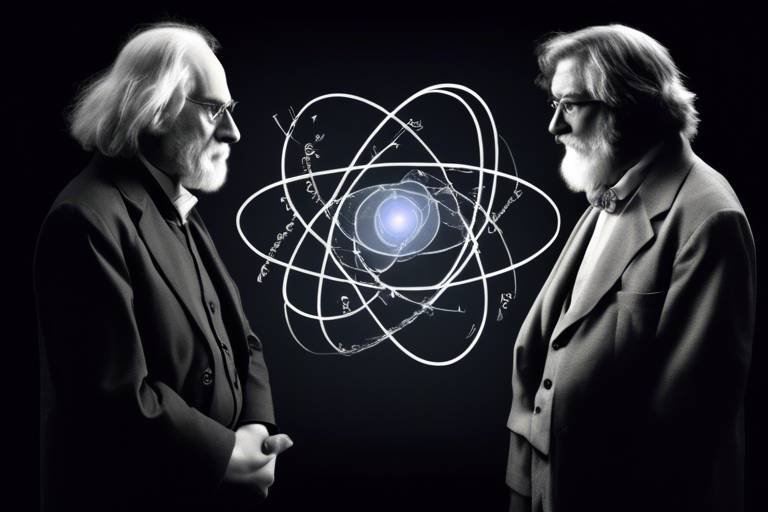Understanding the Philosophy of History
The philosophy of history is a fascinating field that invites us to ponder the very essence of our past. It’s not just about dates and events; it’s about understanding the why and how behind those events. Imagine history as a vast tapestry, intricately woven with threads of human experience, culture, and thought. Each thread represents a story, a moment in time that contributes to the larger picture of our existence. In this exploration, we’ll delve into the philosophical underpinnings that shape our understanding of history, examining various theories and methodologies that have emerged over time.
At its core, the philosophy of history seeks to answer profound questions: What is the nature of historical knowledge? How do we interpret events? And what does it mean to learn from the past? These inquiries are not just academic; they resonate with our everyday lives. By examining history, we can gain insights into contemporary issues, understand societal changes, and perhaps even foresee future trends. It's like holding a mirror to our collective identity, reflecting our triumphs and failures.
As we embark on this journey, we will encounter several key themes and figures that have significantly influenced the way we think about history. From Hegel’s dialectical method, which suggests that history progresses through conflict and resolution, to Marx’s focus on material conditions driving societal changes, each perspective offers a unique lens through which to view the past. We’ll also touch on Nietzsche’s emphasis on individual interpretation and the subjective nature of historical narratives, reminding us that history is not a static record but a dynamic conversation that evolves over time.
Moreover, the methodologies employed in historical analysis play a critical role in shaping our understanding. Whether through comparative history, which looks at different societies to identify patterns, or oral history, which values personal narratives and collective memory, each method enriches our comprehension of historical processes. It’s akin to piecing together a jigsaw puzzle, where each method provides a different piece that helps complete the picture.
As we navigate through these concepts, we will also confront the challenges of interpretation. How do bias and context influence the narratives we construct? What happens when established histories are challenged by new evidence? These questions lead us to the realm of revisionist history and postmodern approaches, which question the objectivity of traditional narratives and highlight the importance of diverse perspectives.
Ultimately, understanding the philosophy of history is not just an academic exercise; it’s a vital part of being an informed and engaged citizen. By exploring these themes, we can better appreciate the complexities of our past and its implications for the present and future. So, let’s dive deeper into this captivating field and uncover the layers of meaning that history offers!
- What is the main focus of the philosophy of history? The philosophy of history examines the underlying principles and theories that shape our understanding of historical events and processes.
- Why is historical interpretation important? Interpretation is crucial as it influences how we understand and present historical events, shaping our collective memory and identity.
- Who are some key philosophers in the field of history? Major figures include Hegel, Marx, and Nietzsche, each offering unique perspectives on how history unfolds.
- How do methodologies impact historical research? Different methodologies, like comparative and oral history, provide various lenses through which to analyze and understand past events.

The Nature of Historical Knowledge
When we think about history, we often picture a linear timeline filled with significant events and notable figures. However, the nature of historical knowledge is much more complex than that. It revolves around the reliability of sources, the intricate role of interpretation, and the ways historians construct narratives from the evidence available to them. Essentially, understanding history is akin to piecing together a jigsaw puzzle, where each piece represents a different perspective, source, or interpretation.
At the heart of this puzzle lies the question: What constitutes a reliable source? Historians must sift through a plethora of documents, artifacts, and oral traditions, each with its own context and potential biases. For instance, a diary from a soldier in World War II may provide a personal glimpse into the emotional landscape of the war, but it might also reflect the soldier's own prejudices and experiences. Thus, the historian's task is not merely to collect information but to critically evaluate the sources, considering factors like authorship, purpose, and context.
Moreover, the role of interpretation cannot be overstated. Historians are not just passive recorders of events; they are active interpreters who bring their own perspectives to the table. This is where the art of storytelling in history comes into play. Historians must decide which narratives to prioritize and how to connect the dots between disparate events. For example, when examining the causes of a revolution, one might focus on economic factors, social unrest, or ideological shifts. Each angle offers a different narrative that shapes our understanding of the past.
To illustrate the complexity of historical knowledge, consider the following table that summarizes the different types of sources historians encounter:
| Type of Source | Description | Example |
|---|---|---|
| Primary Source | Original documents or artifacts created during the time period being studied. | Letters, photographs, official documents |
| Secondary Source | Works that analyze, interpret, or critique primary sources. | History books, documentaries, articles |
| Oral History | Personal accounts and narratives passed down through generations. | Interviews, folklore, community stories |
Understanding the nature of historical knowledge also involves recognizing that history is not static; it is continually evolving. New discoveries, changing societal values, and emerging perspectives can all lead to reinterpretations of historical events. This dynamic nature of history invites us to remain open-minded and curious, challenging us to question established narratives and consider how our understanding of the past shapes our present.
In conclusion, the nature of historical knowledge is a rich and multifaceted field that requires careful consideration of sources, interpretation, and the ever-changing landscape of human understanding. By engaging critically with history, we not only learn about the past but also gain insights into our own lives and the world around us.
- What is a primary source in historical research? A primary source is an original document or artifact created during the time period being studied, such as letters or photographs.
- How do historians ensure the reliability of their sources? Historians evaluate sources by considering their authorship, purpose, and context to determine their reliability and relevance.
- Can historical interpretations change over time? Yes, historical interpretations can change as new evidence is discovered and societal values evolve, leading to reexaminations of established narratives.

Major Philosophers of History
When we dive into the philosophy of history, we encounter a fascinating array of thinkers who have shaped our understanding of the past. These philosophers have not only influenced how we interpret historical events but have also provided frameworks that help us make sense of the complex tapestry of human experience. From the grand narratives proposed by Hegel to the critical insights of Nietzsche, each philosopher offers unique perspectives that challenge and enrich our understanding of history.
One of the most significant figures in this realm is Georg Wilhelm Friedrich Hegel. Hegel's dialectical method is a cornerstone of his philosophy, which suggests that history unfolds through a process of thesis, antithesis, and synthesis. This means that every idea (thesis) inevitably encounters its opposite (antithesis), leading to a new understanding or resolution (synthesis). Imagine a debate where two opposing views clash, and from that clash emerges a more refined perspective. Hegel believed that this process drives historical change, suggesting that history is not random but rather a rational progression towards greater freedom and self-awareness.
Hegel's dialectical method emphasizes the importance of conflict in historical development. For instance, consider the evolution of civil rights movements; the initial struggles (thesis) against oppression often meet resistance (antithesis), resulting in a synthesis that brings about social change. This method invites us to see history as a dynamic and evolving narrative rather than a static collection of facts.
However, Hegel's approach raises intriguing questions about historical determinism versus free will. Some philosophers argue that historical events are predetermined by social, economic, and political forces, leaving little room for individual agency. In contrast, others assert that individuals can shape history through their choices and actions. This tension between determinism and free will is a recurring theme in historical philosophy, prompting us to ponder: to what extent do we control our destinies?
Another towering figure in the philosophy of history is Karl Marx. Marx's theory of historical materialism posits that the material conditions of society—primarily its economic structures—are the driving forces behind historical change. He argued that societal evolution is marked by class struggles, where the conflicts between the ruling class and the proletariat lead to revolutionary changes. Think of it as a game of tug-of-war; as one side pulls harder, the other must adapt or be left behind. Marx's insights provide a lens through which we can analyze the evolution of societies and the impact of economic factors on historical events.
Marx's perspective encourages us to consider how economic conditions shape not only the material world but also our ideas, culture, and social structures. This approach has profound implications for understanding modern societal issues, as it suggests that our current struggles are deeply rooted in historical contexts.
Friedrich Nietzsche, another pivotal thinker, critiques traditional historical narratives by advocating for a more subjective interpretation. He emphasizes the role of individual perspectives and the will to power in shaping history. Nietzsche believed that history is often written by the victors, leading to biased narratives that overlook the complexities of human experience. In his view, history should not merely be a record of events but a canvas reflecting the multitude of human experiences and interpretations. This perspective invites us to question the narratives we accept and to seek out the voices that have been marginalized.
In summary, the major philosophers of history offer a rich tapestry of ideas that challenge us to think critically about the past. Whether through Hegel's dialectics, Marx's materialism, or Nietzsche's subjective lens, these thinkers compel us to reflect on how history is constructed and understood. Their contributions remind us that history is not just a collection of dates and events, but a dynamic interplay of ideas, conflicts, and human experiences.
- What is the philosophy of history? The philosophy of history examines the underlying principles and theories that shape our understanding of historical events and processes.
- Who are the key philosophers in the philosophy of history? Major philosophers include Hegel, Marx, and Nietzsche, each offering distinct perspectives on how history unfolds.
- What is Hegel's dialectical method? Hegel's dialectical method explains historical progress through the conflict of ideas, leading to new understandings.
- How does Marx's historical materialism differ from other theories? Marx's historical materialism focuses on economic conditions as the primary drivers of historical change, emphasizing class struggles.
- What is Nietzsche's critique of traditional history? Nietzsche critiques traditional narratives for being biased and advocates for a more subjective interpretation that values individual experiences.

Hegel's Dialectical Method
Hegel's dialectical method is a fascinating approach that fundamentally alters our understanding of history. Imagine a grand dance where ideas clash and merge, creating new forms and insights. This method is often encapsulated in the triadic structure of thesis, antithesis, and synthesis. At its core, this framework suggests that every prevailing idea (thesis) inevitably encounters opposition (antithesis), leading to a resolution that transcends and incorporates both (synthesis). This is not just a theoretical concept; it reflects the dynamic and often tumultuous nature of historical progression.
Hegel believed that history is not a random series of events but rather a rational process that unfolds over time. Each stage of history is a necessary step toward greater freedom and self-awareness. To illustrate this, consider the evolution of societal norms. For instance, the thesis might be a traditional view on governance, while the antithesis could be revolutionary ideas that challenge that norm. The resulting synthesis is a new form of governance that incorporates aspects of both, leading society closer to enlightenment.
This dialectical progression can be seen as a spiral rather than a linear path. Each synthesis becomes a new thesis, leading to further conflict and resolution. In this way, history is a continuous unfolding of ideas and events, where each moment is both a product of the past and a seed for the future. Hegel's perspective encourages us to view history as a living, breathing entity, constantly evolving and shaping human consciousness.
However, it's essential to recognize that Hegel's method is not without its critics. Some argue that it oversimplifies complex historical events and reduces the rich tapestry of human experience to mere ideological conflicts. Yet, even in this critique, we see a dialectical engagement: the rejection of Hegel's ideas serves as an antithesis that can lead to new understandings of history.
Ultimately, Hegel's dialectical method invites us to embrace the complexity of historical narratives. It encourages a deeper inquiry into how conflicting ideas shape our world, challenging us to look beyond surface-level interpretations. By understanding history through this lens, we can appreciate the intricate web of influences that have shaped human civilization.
- What is Hegel's dialectical method? Hegel's dialectical method is a framework for understanding historical development through the interplay of thesis, antithesis, and synthesis.
- How does this method apply to historical events? It illustrates how conflicting ideas and events lead to new developments, shaping the course of history over time.
- What are some criticisms of Hegel's approach? Critics argue that it oversimplifies complex events and reduces history to ideological conflicts.
- Why is understanding Hegel's method important? It provides insights into the dynamics of change and the evolution of human thought, encouraging a more nuanced view of history.

Historical Determinism vs. Free Will
The debate between historical determinism and free will is a fascinating and complex one, often resembling a tug-of-war between two opposing forces in our understanding of history. On one side, we have determinism, which suggests that events are shaped by factors beyond individual control, such as economic conditions, social structures, and cultural norms. This perspective posits that history unfolds according to predetermined laws, much like a river flowing along a set path, influenced by the terrain it encounters. In this view, the choices made by individuals may seem significant, but they are ultimately constrained by larger historical forces.
On the other hand, the concept of free will argues that individuals possess the ability to make choices independent of external influences. This perspective is akin to a bird soaring freely in the sky, navigating its own path regardless of the winds. Advocates of free will contend that human agency plays a crucial role in shaping historical events. They argue that while external factors do exist, individuals can still exercise their judgment and make decisions that impact the course of history.
The interplay between these two concepts raises important questions: Can we truly separate the influence of societal structures from individual actions? Or are we merely products of our environments, with little room for personal agency? To explore this tension, it's helpful to consider a few key points:
- Deterministic Views: Historical determinism is often associated with thinkers like Marx, who emphasized the role of economic conditions in shaping societies. According to this view, class struggles and material conditions dictate historical outcomes, leaving little room for individual agency.
- Agency and Individual Action: On the flip side, many philosophers, including Nietzsche, stress the importance of individual perspectives and the will to power. They argue that individuals can challenge societal norms and effect change, thereby asserting their free will within the historical narrative.
- Interconnectedness: It's essential to recognize that these two concepts are not mutually exclusive. History is often a complex interplay of both determinism and free will, where societal forces shape individual choices, and those choices, in turn, can influence broader historical trends.
Ultimately, the debate between historical determinism and free will invites us to reflect on our own understanding of history. Are we simply pawns in a grand game dictated by external forces, or do we have the power to shape our destinies? This philosophical inquiry not only enriches our comprehension of the past but also encourages us to consider our roles in the ongoing narrative of human history.
- What is historical determinism? Historical determinism is the idea that events in history are determined by preceding factors, such as social, economic, and cultural conditions, leaving little room for individual choice.
- How does free will fit into historical narratives? Free will emphasizes the role of individual agency and decision-making in shaping history, suggesting that people can influence events despite external constraints.
- Can determinism and free will coexist? Yes, many scholars argue that both concepts can coexist, with historical events being influenced by larger societal forces while still allowing for individual actions to make an impact.

Marx's Historical Materialism
At the heart of Karl Marx's philosophy lies the concept of historical materialism, a powerful lens through which to view the evolution of societies and their structures. This theory posits that the material conditions of a society—its economic base—are the primary drivers of historical change. In simpler terms, Marx believed that the way a society produces and distributes goods fundamentally shapes its social, political, and ideological landscapes. Imagine a tree: the roots represent the economic foundation, while the trunk and branches symbolize the various social and political structures that grow from it. If the roots are weak or unhealthy, the entire tree struggles to thrive.
Marx's approach is a stark contrast to idealist philosophies that prioritize ideas and consciousness as the main forces of history. Instead, he argued that material conditions—including technology, labor, and resources—are the true engines of historical development. For instance, consider the industrial revolution: it transformed not just the economy but also the social fabric, leading to the rise of the working class and the eventual emergence of new political ideologies. Marx's analysis allows us to see how shifts in economic power can lead to significant societal transformations.
To better understand historical materialism, let’s break down its key components:
- Base and Superstructure: Marx introduced the idea that the economic base (the means and relations of production) influences the superstructure (culture, politics, ideology). This relationship is dynamic; while the base shapes the superstructure, the superstructure can also affect the base.
- Class Struggle: Central to Marx's theory is the notion of class struggle, which he believed was the driving force of history. The conflict between the ruling class (bourgeoisie) and the working class (proletariat) creates the conditions for societal change.
- Dialectical Materialism: This concept combines dialectics with materialism, suggesting that societal development occurs through contradictions and their resolutions. Each historical phase contains inherent conflicts that propel society forward.
Marx's historical materialism provides a framework for analyzing not only past events but also contemporary societal issues. By understanding the material conditions that underpin current economic systems, we can better grasp the complexities of modern class struggles and social movements. For instance, the rise of technology and globalization has altered labor dynamics, creating new classes and shifting power balances. This ongoing evolution exemplifies Marx's assertion that history is not a static narrative but a dynamic process influenced by material realities.
In conclusion, Marx's historical materialism remains a vital tool for interpreting the past and understanding the present. By emphasizing the role of economic factors in shaping human history, it invites us to critically engage with the structures that govern our lives and encourages a deeper exploration of how we can influence future developments.
Q: What is historical materialism?
A: Historical materialism is a theory developed by Karl Marx that suggests material conditions, particularly economic factors, are the primary influences on societal development and historical change.
Q: How does historical materialism differ from idealism?
A: Unlike idealism, which prioritizes ideas and consciousness as the main forces of history, historical materialism focuses on material conditions and economic structures as the driving factors of historical development.
Q: What role does class struggle play in historical materialism?
A: Class struggle is central to Marx's theory, positing that the conflict between different social classes (particularly between the bourgeoisie and proletariat) is a key driver of historical change.
Q: How can historical materialism be applied to modern society?
A: Historical materialism can be used to analyze contemporary social issues by examining how current economic conditions, such as globalization and technology, influence class dynamics and power structures.

Nietzsche's Perspective on History
Friedrich Nietzsche, a towering figure in philosophy, had a unique and often provocative view of history that challenges traditional narratives. Unlike many historians who seek to present a linear and objective account of past events, Nietzsche argued for a more subjective interpretation of history. He believed that history is not merely a collection of facts or events but is deeply intertwined with human perspectives, emotions, and the ever-present struggle for power. This perspective invites us to consider history as a dynamic interplay of forces, rather than a static record of what has happened.
One of Nietzsche's key contributions to the philosophy of history is his concept of the "will to power." He posited that this fundamental drive is not just about domination over others but encompasses a broader ambition for growth, creativity, and self-overcoming. In this light, historical events can be seen as expressions of this will, shaped by the individuals and groups who wield power. This approach allows for a more nuanced understanding of history, one that recognizes the complexity of human motivations and the myriad ways in which they influence historical outcomes.
Moreover, Nietzsche was critical of the idea of objective history. He argued that historians often impose their own values and biases onto their narratives, thus distorting the truth of past events. For Nietzsche, the act of interpreting history is inherently subjective, colored by the historian's own experiences and beliefs. This raises important questions: Can we ever truly know history? Are we merely recreating the past through our own lens? In essence, Nietzsche invites us to be wary of the "truths" presented by historians and to recognize the fluidity of historical interpretation.
Nietzsche also emphasized the importance of perspective in shaping historical narratives. He believed that different cultures and individuals bring their own interpretations to historical events, which can lead to vastly different understandings. This plurality of perspectives is essential to grasping the richness of history. For instance, the way a society remembers its heroes and villains can reveal much about its values and beliefs. Nietzsche's approach encourages us to explore these diverse narratives and to appreciate the complexity they bring to our understanding of the past.
In summary, Nietzsche's perspective on history challenges us to reconsider how we approach the past. By acknowledging the subjective nature of historical interpretation and the role of power dynamics, we can gain a deeper appreciation for the complexities of human experience. His ideas prompt us to ask ourselves: What stories are we telling about our history? Who gets to tell them? In a world where history is often used to justify present actions, Nietzsche's insights remind us of the importance of critical thinking and the need to question established narratives.
- What is Nietzsche's main argument about history? Nietzsche argues that history should be understood as a subjective interpretation shaped by individual perspectives, rather than an objective recounting of facts.
- How does the "will to power" influence historical narratives? The "will to power" suggests that historical events are driven by human ambitions and struggles for dominance, reflecting the complexities of human motivations.
- Why is perspective important in understanding history? Different cultural and individual perspectives can lead to diverse interpretations of historical events, enriching our understanding of the past.

Methods of Historical Analysis
When we dive into the , it's like peeling back the layers of an onion. Each layer reveals the complexities of how we interpret the past. Historians employ a variety of methodologies, each with its own strengths and weaknesses, allowing us to piece together the intricate puzzle of history. Understanding these methods is crucial, as they shape our comprehension of past events and influence how we perceive their significance in the present.
One prominent approach in historical analysis is the qualitative method. This method focuses on understanding the context, motivations, and experiences of individuals or groups. By examining primary sources such as letters, diaries, and interviews, historians can construct rich narratives that bring the past to life. For instance, consider how a historian might analyze a soldier's diary from World War II. The emotional depth and personal insights gleaned from such a source can provide a more nuanced understanding of the war's impact on individuals, beyond mere statistics and dates.
On the flip side, we have the quantitative method, which relies on statistical analysis and numerical data to uncover trends and patterns over time. This approach is particularly useful for examining large-scale phenomena, such as population changes, economic shifts, or social movements. By utilizing data sets and employing statistical tools, historians can identify correlations and causations that might not be immediately apparent through qualitative analysis alone. For example, a historian might analyze census data to explore migration patterns and their effects on urban development in the 19th century.
Another fascinating method is comparative history. This technique involves analyzing different societies or time periods to draw parallels and distinctions. By comparing how various cultures respond to similar challenges, historians can identify broader themes and trends that transcend specific contexts. For instance, a comparative analysis of revolutions across different nations can reveal common factors that contribute to societal upheaval, such as economic inequality or political repression. This method enriches our understanding by highlighting the interconnectedness of historical events.
Additionally, oral history plays a vital role in historical analysis, emphasizing the significance of personal narratives and collective memory. Through interviews and storytelling, historians capture voices that might otherwise be overlooked in traditional historical accounts. This method not only preserves individual experiences but also sheds light on the cultural and social dynamics of different communities. For instance, oral histories from marginalized groups can challenge dominant narratives, offering a more inclusive view of the past.
Incorporating these methods into historical analysis allows historians to create a more comprehensive and multifaceted understanding of history. Each approach contributes unique insights, and when combined, they can illuminate the complexities of human experience across time. As we navigate through historical narratives, it's essential to consider how these methodologies influence our interpretations, reminding us that history is not just a collection of dates and events, but a dynamic tapestry woven from diverse perspectives.
- What is the importance of historical methods? Historical methods help us analyze and interpret past events, ensuring that our understanding is well-rounded and informed by various perspectives.
- How does qualitative analysis differ from quantitative analysis? Qualitative analysis focuses on understanding the context and experiences through narratives, while quantitative analysis relies on numerical data to identify trends and patterns.
- What role does oral history play in historical analysis? Oral history captures personal narratives and collective memories, providing insights that may be absent in traditional historical records.

Comparative History
Comparative history is like holding up a mirror to the past, allowing us to see not just one reflection but many. It involves examining different societies or time periods side by side to uncover patterns, similarities, and differences that might otherwise go unnoticed. By comparing historical events, cultures, and processes, historians can glean insights that enrich our understanding of how societies evolve and interact over time. Imagine trying to understand a painting by only looking at one color; comparative history adds layers and dimensions to our comprehension, revealing the intricate tapestry of human experience.
One of the key benefits of comparative history is its ability to challenge assumptions. For instance, when we juxtapose the French Revolution with the Haitian Revolution, we not only learn about the unique circumstances of each event but also about broader themes of liberty, equality, and social upheaval. Such comparisons can highlight how different factors—like geography, culture, and economic conditions—shape historical outcomes. They also encourage us to consider how local contexts influence global narratives.
Furthermore, comparative history can illuminate the dynamics of colonialism and imperialism across various regions. By studying the British Empire's impact in India alongside its influence in Africa, historians can analyze the methods of control, resistance, and adaptation in diverse settings. This approach not only enhances our understanding of the past but also provides critical insights into ongoing global issues, such as migration, cultural exchange, and economic disparity.
However, conducting comparative history is not without its challenges. It requires a careful selection of cases and a nuanced understanding of each context to avoid oversimplification. Historians must be cautious not to impose their own biases or preconceived notions onto the subjects they study. Instead, they should strive for a balanced perspective that respects the complexity of each historical narrative.
In essence, comparative history is a powerful tool for historians, enabling them to draw connections and distinctions that deepen our understanding of human societies. By analyzing the past through a comparative lens, we can better appreciate the intricate web of influences that shape our world today.
- What is the main goal of comparative history?
The main goal of comparative history is to analyze and understand historical events, societies, and processes by comparing them across different contexts, which helps to identify patterns and divergences. - How does comparative history differ from traditional historical analysis?
Unlike traditional historical analysis, which often focuses on a single narrative or event, comparative history examines multiple cases to draw broader conclusions about human behavior and societal development. - Can comparative history be applied to contemporary issues?
Yes, comparative history can be applied to contemporary issues by analyzing current events in light of historical precedents, helping to inform our understanding of ongoing social, political, and economic dynamics.

Oral History and Memory
Oral history is a fascinating field that dives deep into the rich tapestry of human experience, capturing stories that might otherwise fade into oblivion. Unlike traditional historical methods that often rely on written documents, oral history emphasizes the importance of personal narratives and collective memory. These narratives are not just anecdotes; they are vital pieces of evidence that reveal how individuals and communities understand their past. Imagine sitting around a campfire, listening to an elder recount tales of their youth, filled with vivid details and emotions. This is the essence of oral history—it's history told through the voices of those who lived it.
One of the most compelling aspects of oral history is its ability to highlight diverse perspectives. Often, mainstream historical narratives can overlook the experiences of marginalized groups, but oral history gives them a platform. By collecting and preserving these stories, historians can paint a more comprehensive picture of the past. This approach not only enriches our understanding of historical events but also fosters a sense of connection and empathy among different cultures and communities.
Moreover, memory plays a critical role in shaping these oral histories. Memory is not a static repository of facts; it is dynamic and influenced by emotions, context, and time. As people recount their experiences, they often reinterpret events based on their current understanding and feelings. This process can lead to variations in how the same event is remembered by different individuals. For instance, two siblings might recall their childhood in entirely different ways, each reflecting their unique perspectives and emotional responses. This subjectivity adds layers of complexity to historical narratives and reminds us that history is often a mosaic of individual experiences.
Oral history projects can take many forms, ranging from formal interviews conducted by historians to informal conversations within families. In recent years, technology has revolutionized how we collect and preserve these stories. With the advent of digital recording devices and online platforms, it has become easier than ever to capture and share oral histories. For example, many institutions now host digital archives where these recordings are accessible to the public, allowing future generations to engage with the past in a more personal way.
However, it’s important to approach oral history with a critical eye. While these narratives provide invaluable insights, they can also be influenced by bias and memory distortion. Factors such as the interviewee's emotional state, the context of the interview, and even the interviewer’s framing can all impact the reliability of the account. Therefore, historians must carefully analyze oral histories alongside other sources to construct a well-rounded understanding of historical events.
In conclusion, oral history and memory are vital components of the historical narrative. They remind us that history is not just a collection of dates and events but a living, breathing entity shaped by the voices of those who experienced it. By valuing these personal stories, we not only uncover the complexities of the past but also enrich our present and future understanding of humanity.
- What is oral history? Oral history is the collection and study of historical information using audio recordings of interviews with people having personal knowledge of past events.
- How does oral history differ from traditional history? Unlike traditional history, which often relies on written documents, oral history emphasizes personal narratives and the subjective experiences of individuals.
- Why is memory important in oral history? Memory shapes how individuals recount their experiences, influencing the narrative and providing a more nuanced understanding of historical events.
- What are some challenges associated with oral history? Challenges include potential bias, memory distortion, and the need for careful analysis to ensure a balanced historical perspective.

The Role of Interpretation in History
When we think about history, it’s tempting to imagine a straightforward timeline of events, neatly packaged and ready to be consumed. However, the reality is far more complex. Interpretation plays a crucial role in how we understand history. It’s not just about what happened; it’s about how those events are perceived, framed, and narrated. Every historian brings their own perspective, biases, and cultural context to their work, which can significantly influence the way history is recorded and understood.
Consider this: two historians could look at the same set of facts and come away with entirely different conclusions. This variability is largely due to the interpretative lens through which they view the evidence. For instance, one historian might emphasize economic factors in explaining a revolution, while another might focus on social movements or political ideologies. This divergence not only highlights the subjective nature of historical analysis but also underscores the importance of recognizing these different interpretations in our understanding of the past.
The impact of interpretation extends to how we engage with historical narratives. The context in which a historian writes—such as the political climate or social norms of their time—can shape their interpretation. For example, during periods of nationalistic fervor, historians may emphasize events that bolster national pride, while downplaying or omitting those that challenge it. This can lead to a skewed understanding of history, where certain voices and perspectives are amplified while others are marginalized.
Moreover, the role of interpretation is not static. As new evidence emerges or as societal values shift, historical interpretations can change. This is evident in the field of revisionist history, where established narratives are challenged and reinterpreted based on fresh insights or perspectives. For instance, the portrayal of colonialism has evolved significantly over the decades, with many historians now critically examining its impacts and consequences rather than simply celebrating the achievements of colonial powers.
In this light, we can see that interpretation is not merely an academic exercise; it has real-world implications. The way history is interpreted can influence national identity, cultural memory, and even policy decisions. Understanding the role of interpretation in history invites us to be more critical consumers of historical narratives. It encourages us to ask questions like: Whose story is being told? What perspectives are missing? And how does the context of the historian shape the narrative?
In conclusion, the role of interpretation in history is both profound and intricate. It reminds us that history is not just a collection of dates and events but a dynamic interplay of narratives shaped by human experience. By engaging with multiple interpretations, we enrich our understanding of the past and its implications for the present and future.
- What is the importance of interpretation in history?
Interpretation is essential because it shapes how historical events are understood and presented, influencing our perceptions of the past. - Can historical interpretations change over time?
Yes, as new evidence emerges and societal values shift, interpretations of history can evolve, leading to revised understandings of past events. - What is revisionist history?
Revisionist history challenges established narratives, often reinterpreting events based on new evidence or perspectives, which can lead to significant shifts in understanding historical events. - How do biases affect historical interpretation?
Historians’ personal biases, cultural contexts, and the prevailing political climate can all influence how they interpret historical events, potentially leading to skewed narratives.

Revisionist History
Revisionist history is a fascinating and often contentious field that seeks to challenge and reinterpret established historical narratives. At its core, revisionism is about questioning the accepted version of events and exploring alternative perspectives that may have been overlooked or marginalized. This approach is not merely about rewriting history for the sake of it; rather, it aims to uncover the complexities of the past that can provide a more nuanced understanding of historical events.
One of the key aspects of revisionist history is its reliance on new evidence or interpretations that can significantly alter our understanding of past events. For instance, historians may uncover forgotten documents, artifacts, or testimonies that shed light on previously ignored voices or viewpoints. This can lead to a reevaluation of significant events, such as wars, social movements, or political decisions. A prime example of this is the reinterpretation of the causes and consequences of the American Civil War, where economic, social, and political factors are reassessed to provide a more comprehensive picture.
Revisionist historians often focus on the following elements:
- New Evidence: The discovery of previously unknown documents or artifacts can lead to fresh interpretations of historical events.
- Marginalized Voices: Revisionist history often seeks to highlight the experiences and perspectives of groups that have been excluded from mainstream historical narratives, such as women, minorities, and indigenous peoples.
- Contextual Analysis: Understanding the historical context in which events occurred allows for a deeper appreciation of the complexities involved, rather than viewing them in isolation.
However, revisionist history is not without its critics. Some argue that it can lead to the distortion of facts or the promotion of agendas that may not be grounded in rigorous historical methodology. Detractors often warn that revisionism can sometimes blur the lines between objective analysis and subjective interpretation, potentially leading to a form of historical relativism where all narratives are seen as equally valid, regardless of evidence.
Despite these criticisms, the role of revisionist history is crucial in keeping historical discourse dynamic and relevant. It encourages ongoing dialogue and debate, reminding us that history is not a static collection of facts but a living narrative that evolves as new insights emerge. By engaging with revisionist perspectives, we can challenge our assumptions, broaden our understanding, and appreciate the multifaceted nature of human experiences throughout time.
In conclusion, revisionist history serves as a vital tool for historians and the public alike, fostering a deeper engagement with the past. It invites us to ask important questions about who tells the story of history and whose stories are included or excluded. Ultimately, by embracing revisionism, we can cultivate a richer, more inclusive understanding of our shared human history.
- What is revisionist history? Revisionist history is the practice of reinterpreting established historical narratives, often based on new evidence or perspectives.
- Why is revisionist history important? It helps to uncover overlooked or marginalized perspectives, providing a more nuanced understanding of historical events.
- What are some criticisms of revisionist history? Critics argue that it can lead to distortion of facts and promote subjective interpretations over objective analysis.
- How does revisionist history impact our understanding of the past? It encourages ongoing dialogue and debate, reminding us that history is dynamic and evolves as new insights emerge.

Postmodern Approaches
When we dive into the realm of to history, we enter a fascinating landscape that challenges the traditional narratives we've grown accustomed to. Imagine walking through a gallery of historical paintings, each one telling a story, but as you approach, you realize that each artist has painted their own version of the same event. This is the essence of postmodernism in history—it emphasizes the subjective nature of historical interpretation and the diverse perspectives that shape our understanding of the past.
At the heart of postmodern historical analysis lies a skepticism towards the idea of an objective truth. Postmodernists argue that history is not a linear progression of facts but rather a complex tapestry woven from various threads of cultural, social, and political contexts. This perspective encourages historians to question established narratives and consider how factors such as power dynamics, identity, and memory influence our understanding of historical events.
One of the key tenets of postmodernism is the idea that history is inherently fragmented. Just as a shattered mirror reflects distorted images, our historical narratives are often pieced together from incomplete records, personal biases, and differing interpretations. This fragmentation leads to what some historians refer to as a "crisis of representation." In other words, how do we accurately represent the past when our sources are so varied and often contradictory?
Postmodern historians often employ a variety of methodologies to explore these complexities, including:
- Deconstruction: This technique involves breaking down established historical narratives to reveal underlying assumptions and biases.
- Intertextuality: Postmodernists analyze how different texts and narratives influence each other, shaping our understanding of history.
- Oral Histories: By valuing personal stories and experiences, historians can uncover perspectives that are often overlooked in traditional historical accounts.
Moreover, postmodern approaches highlight the importance of context. For instance, a historical event may be interpreted differently depending on the cultural or social lens through which it is viewed. This idea resonates with the notion that history is not just about dates and events; it is also about the stories we tell and the meanings we attach to those stories. As a result, postmodern historians often seek to include marginalized voices that have been silenced in mainstream narratives.
In conclusion, embracing a postmodern approach to history allows us to appreciate the rich tapestry of human experience. It encourages us to question the narratives we have inherited and to recognize the multiplicity of voices that contribute to our understanding of the past. As we navigate this complex landscape, we are reminded that history is not merely a record of what happened; it is a dynamic interplay of interpretations that continues to evolve.
Q1: What is the main idea behind postmodern approaches to history?
A1: The main idea is that history is subjective and influenced by various cultural, social, and political contexts. It challenges the notion of an objective historical truth.
Q2: How do postmodern historians analyze historical events?
A2: They often use methods like deconstruction, intertextuality, and oral histories to uncover different perspectives and challenge established narratives.
Q3: Why is the inclusion of marginalized voices important in postmodern history?
A3: Including marginalized voices helps to create a more comprehensive and nuanced understanding of history, highlighting experiences that are often overlooked in traditional accounts.
Frequently Asked Questions
- What is the philosophy of history?
The philosophy of history is a field of study that examines the fundamental nature and meaning of history. It explores various theories and methodologies that help us understand how historical events are interpreted and what significance they hold for both the past and the present. Essentially, it’s about asking the big questions: Why do we study history? What can it teach us about ourselves and our societies?
- How do historians determine what is reliable historical knowledge?
Historians assess the reliability of historical knowledge by critically evaluating sources, considering the context in which they were created, and examining the evidence presented. They look at primary sources, like documents and artifacts, and secondary sources, such as analyses by other historians. The goal is to construct narratives that are as accurate and comprehensive as possible, acknowledging that interpretation plays a significant role in how history is understood.
- Who are some major philosophers of history?
Some key figures in the philosophy of history include G.W.F. Hegel, Karl Marx, and Friedrich Nietzsche. Hegel introduced the dialectical method, emphasizing the progression of history through contradictions. Marx focused on historical materialism, arguing that economic factors drive societal change. Nietzsche challenged traditional narratives, advocating for a more subjective approach to understanding history through individual perspectives.
- What is Hegel's dialectical method?
Hegel's dialectical method is a framework for understanding historical development through a process of thesis, antithesis, and synthesis. This means that every idea (thesis) will encounter its opposite (antithesis), and the conflict between the two leads to a new understanding (synthesis). This process illustrates how history is not linear but rather a progression of ideas and events that evolve over time.
- What is the difference between historical determinism and free will?
Historical determinism suggests that events are shaped by pre-existing conditions and forces, implying that individuals have little control over their actions. In contrast, the notion of free will posits that individuals can make choices that influence historical outcomes. This tension raises interesting debates about the extent to which human agency plays a role in shaping history.
- How does Marx's historical materialism influence our understanding of history?
Marx's historical materialism posits that material conditions, particularly economic factors, are the primary drivers of historical change. This perspective allows us to analyze societal evolution through the lens of class struggles and economic developments, highlighting how material realities shape human experiences and societal structures.
- What is the significance of oral history?
Oral history emphasizes the importance of personal narratives and collective memory in shaping our understanding of the past. It allows marginalized voices to be heard and provides a richer, more diverse perspective on historical events. By capturing individual experiences, oral history contributes to a more comprehensive narrative that reflects the complexities of human history.
- What is revisionist history?
Revisionist history challenges established narratives by reinterpreting events based on new evidence or perspectives. This approach can lead to significant shifts in how historical events are understood, often sparking debates about the accuracy and objectivity of traditional accounts. It highlights the dynamic nature of history and the ongoing process of interpretation.
- How do postmodern approaches influence historical interpretation?
Postmodern approaches question the objectivity of historical narratives, emphasizing that history is subjective and shaped by context, culture, and power dynamics. This perspective encourages historians to consider multiple viewpoints and recognize that history is not a fixed account but a tapestry of interpretations that reflect diverse experiences and understandings.



















